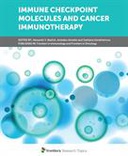Explore

Immune Checkpoint Molecules and Cancer Immunotherapy
0 Ungluers have
Faved this Work
Login to Fave
For the faultless function of the immune system, tight regulation of immune cell activation, immuno-suppression and the strength and efficiency of the immune response is essential. Immune checkpoint (ICP) molecules can amplify or dampen signals that lead to the modulation of specific immune activities. Under physiological conditions, immune checkpoints are essential to prevent autoimmune manifestations and to preserve self-tolerance. They help modulate immune responses by either promoting or inhibiting T-cell activation. However, in the context of cancer, malignant cells can dysregulate the expression of immune checkpoint proteins on immune cells in order to suppress anti-tumor immune responses and to gain immune resistance. Moreover, tumor cells themselves can also express some checkpoints proteins, thereby enabling these cells to externally orchestrate immune regulatory mechanisms. Several recent studies have confirmed that the expression of immune checkpoints could be an important prognostic parameter for cancer development and for patient outcome. Therefore, cancer immunotherapy based on the modulation of immune checkpoint molecules alone, or in combination with conventional tumor therapy (chemo- or/and radiotherapy), is now in focus as a means of developing new therapeutic strategies for different types of cancer. The two well-known molecules – CTLA4 and PD-1 - serve as important examples of such checkpoint proteins of important therapeutic potential. Thus far, inhibitors of CTLA4 and PD-1 have been approved to treat only a limited number of malignancies (e.g. malignant Melanoma, Non-Small Cell Lung Cancer). Many others are currently under investigation and the list of immune checkpoint molecules for potential therapeutic targeting is still growing. However, the clinical response to inhibitors of checkpoint molecules is not sufficient in all cases. Therefore, further studies are needed to improve our knowledge of such immunomodulatory proteins and their associated signaling pathways. Several key signaling pathways which are involved in the regulation of expression of checkpoint molecules in immune cells and in cancer cells have already been identified including MAPK, PI3K, NF-kB, JAKs and STATs. These (and future discovered) signaling pathways could give rise to the development of new strategies for modulating the expression of ICPs and thereby, improving anti-cancer immune responses. The main aim of the Research Topic is to collect novel findings from scientists involved in basic research on immune checkpoints as well as in translational studies investigating the use of checkpoint inhibtors in immunotherapy in experimental settings. We welcome the submission of Review, Mini-Review and Original Research articles that cover the following topics: 1. Molecular mechanisms underlying regulation of ICP expression in immune and/or cancer cells.2. Characterization of signaling pathways downstream ICP molecules.3. Cellular responses to ICP blockade.4. Identification of new compounds interfering with ICP expression and/or signaling.5. ICP-mediated interactions between cancer cells and immune cells. 6. Functional links between ICP and cytokines/chemokines.7. Molecular mechanisms of ICP inhibition in the context of experimental cancer immunotherapy.
This book is included in DOAB.
Why read this book? Have your say.
You must be logged in to comment.
Rights Information
Are you the author or publisher of this work? If so, you can claim it as yours by registering as an Unglue.it rights holder.Downloads
This work has been downloaded 245 times via unglue.it ebook links.
- 95 - mobi (CC BY) at Unglue.it.
- 87 - epub (CC BY) at Unglue.it.
- 63 - pdf (CC BY) at Unglue.it.
Keywords
- cancer immunotherapy
- checkpoint blockade
- CTLA-4 (CD152)
- cytotoxic T lymphocytes
- immune checkpoint molecules
- Immunosuppression
- Metabolic checkpoints
- PD-1 (CD279)
- PDL1
- Tumor microenvironment
Links
DOI: 10.3389/978-2-88945-732-8Editions

